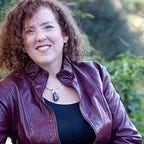The Big Idea: changing how power is distributed changes everything. And I do mean everything.
This article is selected from Future Here Now, a daily email that gives readers practical insight and hands-on tools for navigating the huge changes we’re all experiencing in our lives, our organizations and our communities. Subscribers get five posts per week with news, analysis and step-by-step guidance for putting what they’ve discovered into action. And all for the cost of one latte per month!
If you like this, you’ll like that even more. Check it out at http://wiseeconomy.substack.com.
We have a strange relationship with power. For most of our history, actual power — political, economic, military, even social — has largely belonged to someone other than ourselves. Sometimes that bothers us, but a lot of times we’ve been OK with that — as long as we get some protection or security out of the deal. We’ve been making that agreement with the powerful since the Bronze Age, if not before (my ancient history is rusty these days).
But what happens when a radically new way to distribute power both hands that power to us… but also makes us more exposed to a volatile and complex world? Do we rush back behind the skirts of old-school power, or do we figure out new ways to work and collaborate and take control of our lives and communities in a radically new way?
That’s the challenge in front of us right now. And if you look across the world — at grassroots protests and dictator supporters, at digital nomads and people who can’t tolerate an expanded definition of whose humanity matters — then you see the conflict between the old power model and the new power model playing out in real time.
Since …. a really long time ago… we’ve banded together in communities under the leadership of a leader, or a small cabal of leaders. Early on, we designated them as gods, Pharaohs, because having a god as your leader offers the hope that you will be protected from famine or hordes or whatever. Later on, we mostly gave up on the god part of that equation, and replaced that role with kings and knights and shahs and eventually elected officials. But an undercurrent remained the same: a general belief that you were better off giving up at least some of your independence to someone who could protect you from harm. Those leaders often failed to do that, across history, but we kept signing on to the deal because it was the best one we had.
Those few who believed that we could do without leaders — that we had the capacity to self-organize, to solve our own problems, to figure out how to meet our needs collaboratively — those folks were labelled as anarchists, as deluded and dangerous, and generally driven underground or worse. Not only did they present a threat to the existing power structures, their existence — and occasional, sporadic successes — raised uncomfortable questions about whether we really needed that deal with power after all. Better to not think about that.
We are in a historical moment now where we have more capacity, more of the technology that we would need, to do that self-organizing that the 19th century anarchists could only dream of. We can reach thousands of people in an instant, we can mobilize en masse to march or vote or test water quality, we can raise up voices that would have gone completely unheard in previous eras. We don’t have to rely on arbiters of taste or morals to tell us what is good and what is not. We can carry that power collectively, ourselves.
And in many senses, we can do what our old agreement with conventional power said that we would get in exchange for our obedience. In at least some cases, proponents of this new distributed power would argue, we can do it better — more effectively, more humanely, more equitably — than the old power every managed to do.
But.
When you are the source of power, then you have to make all the decisions yourselves. No one tells you what to do. If you get it right, you get the praise. But if you get it wrong, you get the blame.
Part of what makes this transition to the Fusion Era volatile is that distributed power has this kind of tradeoff embedded in it, and nothing has really prepared us for that level of personal and collective responsibility. So we discover that we have this distributed power, but we don’t know how to use it. Or it opens possibilities that are so ambiguous, so complex, that we get the urge to run back to the safety of those old protections.
This is the conflict that we see at play in our culture wars, in our fearful NIMBY council sessions, in our managers’ resistance to innovation directives handed down from Somewhere Else. We are collectively moving toward a new era, but moving in that direction means giving up the shelter of leaders. And that is playing out as one of the major challenges, and major transitions, that we will have to navigate at all levels of our society over the next ten to 20 years.
